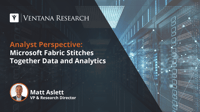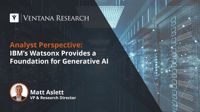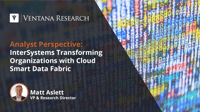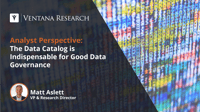I have written before about the rising popularity of the data fabric approach for managing and governing data spread across distributed environments comprised of multiple data centers, systems and applications. I assert that by 2025, more than 6 in 10 organizations will adopt data fabric technologies to facilitate the management and processing of data across multiple data platforms and cloud environments. The data fabric approach is also proving attractive to vendors, including Microsoft, as a...
Read More
Topics:
business intelligence,
Analytics,
Cloud Computing,
Data Governance,
Data Management,
Data,
Digital Technology,
AI & Machine Learning,
Analytics & Data,
analytic data platforms
It is a mark of the rapid, current pace of development in artificial intelligence (AI) that machine learning (ML) models, until recently considered state of the art, are now routinely being referred to by developers and vendors as “traditional.” Generative AI, and large language models (LLMs) in particular, have taken the AI world by storm in the past year, automating and accelerating the development of content, including text, digital images, audio and video, as well as computer programs and...
Read More
Topics:
business intelligence,
Analytics,
Cloud Computing,
Data Governance,
Data,
Digital Technology,
natural language processing,
AI & Machine Learning,
Analytics & Data,
analytic data platforms
The shift from on-premises server infrastructure to cloud-based and software-as-a-service (SaaS) models has had a profound impact on the data and analytics architecture of many organizations in recent years. More than one-half of participants (59%) in Ventana Research’s Analytics and Data Benchmark research are deploying data and analytics workloads in the cloud, and a further 30% plan to do so. Customer demand for cloud-based consumption models has also had a significant impact on the products...
Read More
Topics:
business intelligence,
Cloud Computing,
Data Management,
Data,
natural language processing,
data operations,
AI & Machine Learning,
Analytics & Data,
analytic data platforms,
Operational Data Platforms
Earlier this year, I wrote about the increasing importance of data observability, an emerging product category that takes advantage of machine learning (ML) and Data Operations (DataOps) to automate the monitoring of data used for analytics projects to ensure its quality and lineage. Monitoring the quality and lineage of data is nothing new. Manual tools exist to ensure that it is complete, valid and consistent, as well as relevant and free from duplication. Data observability vendors,...
Read More
Topics:
business intelligence,
Cloud Computing,
Data Management,
Data,
data operations
One of the most significant considerations when choosing an analytic data platform is performance. As organizations compete to benefit most from being data-driven, the lower the time to insight the better. As data practitioners have learnt over time, however, lowering time to insight is about more than just high-performance queries. There are opportunities to improve time to insight throughout the analytics life cycle, which starts with data ingestion and integration, includes data preparation...
Read More
Topics:
business intelligence,
Data,
data operations,
AI & Machine Learning,
analytic data platforms
I have written before about the continued use of specialist operational and analytic data platforms. Most database products can be used for operational or analytic workloads, and the number of use cases for hybrid data processing is growing. However, a general-purpose database is unlikely to meet the most demanding operational or analytic data platform requirements. Factors including performance, reliability, security and scalability necessitate the use of specialist data platforms. I assert...
Read More
Topics:
business intelligence,
Cloud Computing,
Data Management,
Data,
Analytics & Data,
analytic data platforms
The data catalog has become an integral component of organizational data strategies over the past decade, serving as a conduit for good data governance and facilitating self-service analytics initiatives. The data catalog has become so important, in fact, that it is easy to forget that just 10 years ago it did not exist in terms of a standalone product category. Metadata-based data management functionality has had a role to play within products for data governance and business intelligence for...
Read More
Topics:
business intelligence,
Data Governance,
Data Management,
Data,
data operations,
Analytics & Data

















